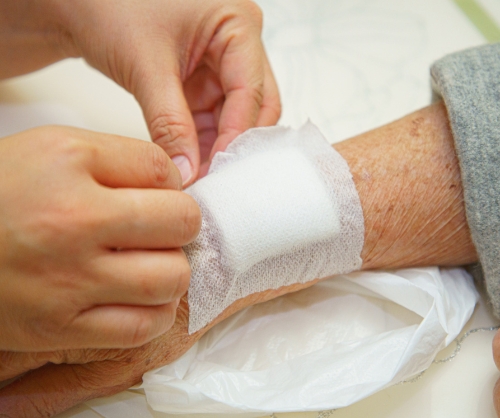 The body experiences a number of changes with age, including thinner skin, reduced fat and lower muscle mass. These factors make older adults more susceptible to cuts, pressure ulcers and infections, slow the healing process and increase the risk of chronic wounds.
The body experiences a number of changes with age, including thinner skin, reduced fat and lower muscle mass. These factors make older adults more susceptible to cuts, pressure ulcers and infections, slow the healing process and increase the risk of chronic wounds.
After age 65, a bandage and disinfectant may not be sufficient to prevent infection or promote healing. Without proper care, wounds can worsen, leading to necrosis, chronic infections and more serious complications, which is why dedicated wound care is essential.
Whether for short-term rehabilitation or long-term care, our team provides specialized wound care that includes cleansing, monitoring and advanced treatments to support healing and reduce infection risks.
Why Wound Care Is Different for Older Adults
Aging brings about physical changes, reduced mobility, and chronic health conditions that affect how wounds heal. These factors make pressure ulcers, skin tears and infections more common and slow the body’s ability to generate new tissue. Key concerns include:
- Limited Mobility: Long-term care patients often have sedentary lifestyles, increasing the risk of skin breakdown and pressure ulcers.
- Circulation Issues: Conditions like diabetes, varicose veins and cardiovascular disease can impair circulation, making wounds heal more slowly and leading to venous or neuropathic ulcers.
- Thinning Skin: Not only is older skin more fragile, but it also has a weaker barrier function, making it prone to dryness, infections and slow healing.
- Weaker Immune System: The body’s natural ability to fight off bacteria declines with age, increasing the risk of infections and complications.
Without proper care, wounds may remain untreated or fail to heal completely, increasing the risk of chronic, painful injuries that are highly susceptible to infection.
Benefits of Wound Care for Older Adults
Comprehensive wound care prevents complications and supports faster healing. With hands-on care such as dressing changes, infection management and debridement, we help:
- Reduce hospital readmission rates
- Lower the risk of serious complications like necrosis, infections, amputation and disability
- Prevent infections from spreading throughout the body
- Improve pain management, as well as mental and physical well-being
- Customize care based on a patient’s condition, with frequent monitoring for those who are immobile or in wheelchairs.
- Manage treatment costs by reducing long-term care expenses related to chronic conditions.
Our Services
At West Hartford Health & Rehabilitation Center, our dedicated staff takes a personalized approach to wound care, ensuring that each patient receives the most effective treatment for their condition. We are proud to have a wound-certified RN on staff and consult with a leading Wound Care Specialist who makes weekly rounds to assess and treat complex cases.
Our comprehensive wound care services include:
- Routine bedside wound care, including cleansings and dressing changes
- Assessment of skin conditions, such as rashes and dermatological concerns
- Debridement to remove dead tissues and promote healing
- Catheter, line and tube insertion and removal
- Negative pressure wound therapy and vacuum-assisted closure
- Antibiotics therapy for infection prevention and management
- Specialized wound dressings based on wound depth, type and size
- Compression therapy to improve circulation
In addition to direct wound treatment, we consider other factors that could slow the healing process, including:
- Nutritional deficiencies
- Weight management
- Post-surgical recovery
- Skin moisture levels and barrier function
- Chronic health conditions
- Medication side effects
- Hygiene and infection prevention
- Activity levels and mobility
Proper wound care is essential for long-term health and quality of life.
To learn more about our services for short-term rehabilitation or a long-term stay,
Contact Us Today




